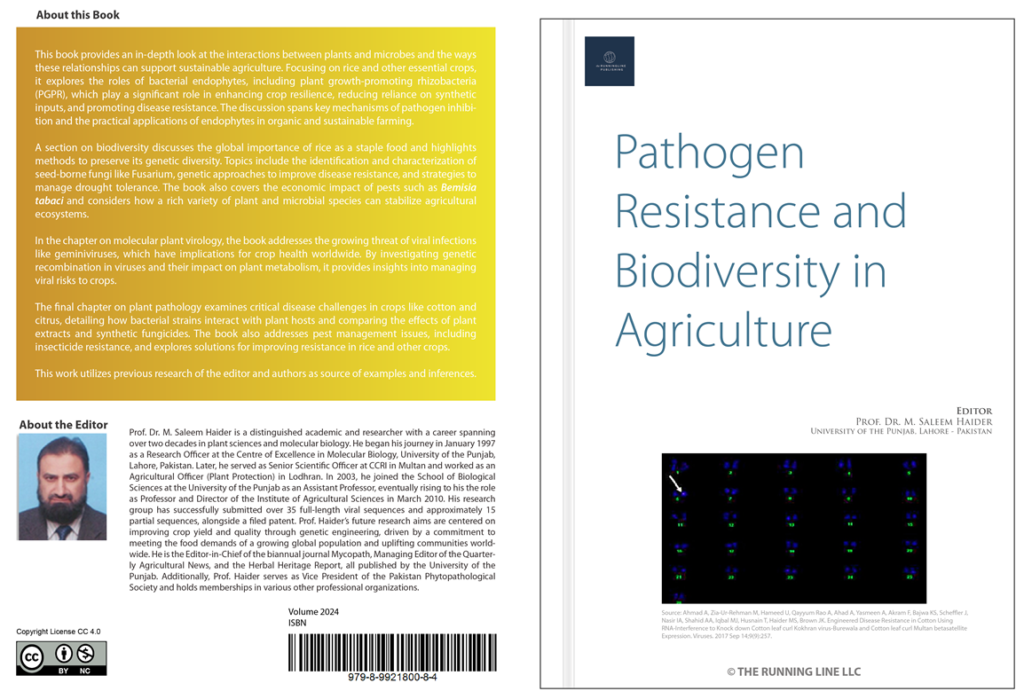
Pathogen Resistance and Biodiversity in Agriculture
Edited by
Prof. Dr. M. Saleem Haider
Release Date: November, 2024
Copyright: 2024
Pages: 104
ISBN: 979-8-9921800-8-4
Book Description
This book provides an in-depth look at the interactions between plants and microbes and the ways these relationships can support sustainable agriculture. Focusing on rice and other essential crops, it explores the roles of bacterial endophytes, including plant growth-promoting rhizobacteria (PGPR), which play a significant role in enhancing crop resilience, reducing reliance on synthetic inputs, and promoting disease resistance. The discussion spans key mechanisms of pathogen inhibition and the practical applications of endophytes in organic and sustainable farming.
A section on biodiversity discusses the global importance of rice as a staple food and highlights methods to preserve its genetic diversity. Topics include the identification and characterization of seed-borne fungi like Fusarium, genetic approaches to improve disease resistance, and strategies to manage drought tolerance. The book also covers the economic impact of pests such as Bemisia tabaci and considers how a rich variety of plant and microbial species can stabilize agricultural ecosystems.
In the chapter on molecular plant virology, the book addresses the growing threat of viral infections like geminiviruses, which have implications for crop health worldwide. By investigating genetic recombination in viruses and their impact on plant metabolism, it provides insights into managing viral risks to crops.
The final chapter on plant pathology examines critical disease challenges in crops like cotton and citrus, detailing how bacterial strains interact with plant hosts and comparing the effects of plant extracts and synthetic fungicides. The book also addresses pest management issues, including insecticide resistance, and explores solutions for improving resistance in rice and other crops.
This work utilizes previous research of the editor and authors as source of examples and inferences.
About Editor
Prof. Dr. M. Saleem Haider is a distinguished academic and researcher with a career spanning over two decades in plant sciences and molecular biology. He began his journey in January 1997 as a Research Officer at the Centre of Excellence in Molecular Biology, University of the Punjab, Lahore, Pakistan. Later, he served as Senior Scientific Officer at CCRI in Multan and worked as an Agricultural Officer (Plant Protection) in Lodhran. In 2003, he joined the School of Biological Sciences at the University of the Punjab as an Assistant Professor, eventually rising to his the role as Professor and Director of the Institute of Agricultural Sciences in March 2010. His research group has successfully submitted over 35 full-length viral sequences and approximately 15 partial sequences, alongside a filed patent. Prof. Haider’s future research aims are centered on improving crop yield and quality through genetic engineering, driven by a commitment to meeting the food demands of a growing global population and uplifting communities worldwide. He is the Editor-in-Chief of the biannual journal Mycopath, Managing Editor of the Quarterly Agricultural News, and the Herbal Heritage Report, all published by the University of the Punjab. Additionally, Prof. Haider serves as Vice President of the Pakistan Phytopathological Society and holds memberships in various other professional organizations.
